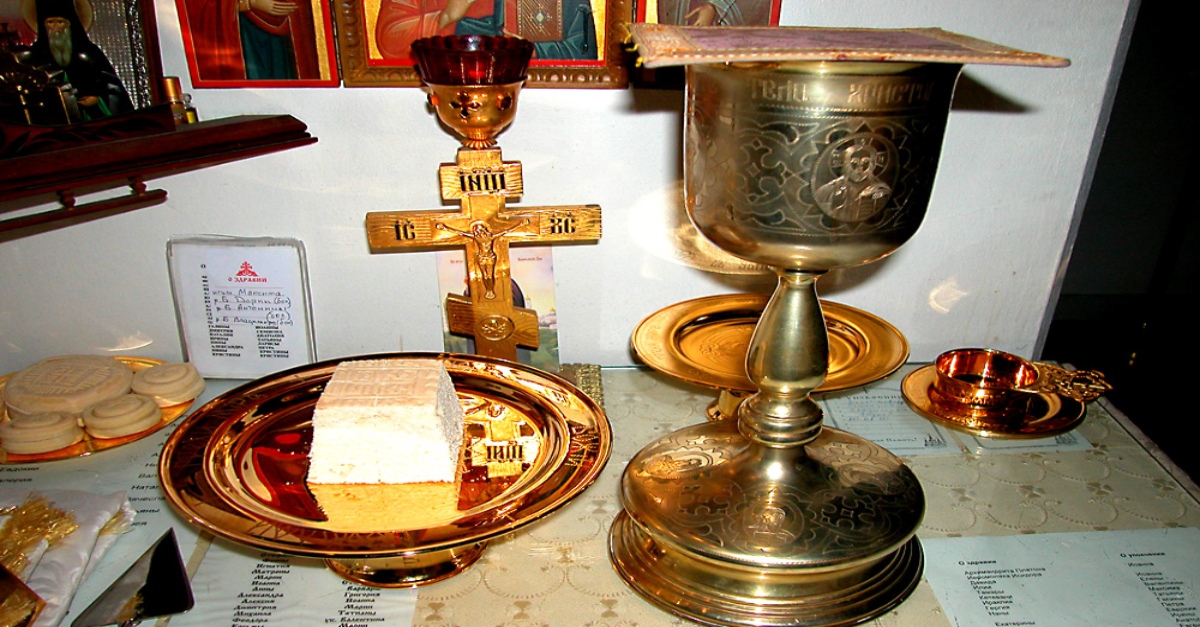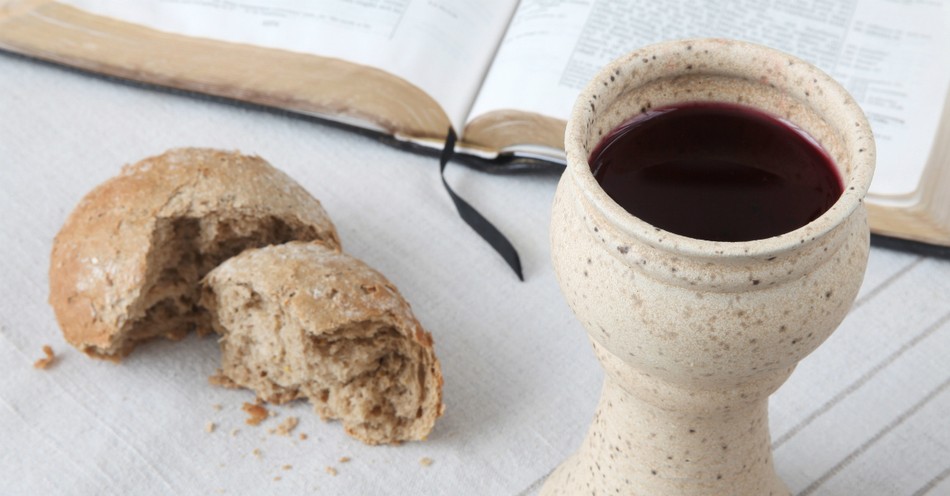"For as often as you eat this bread and drink the cup, you proclaim the Lord's death until he comes." ~ 1 Corinthians 11:26
Holy Communion (Eucharist) Definition
The Eucharist, also known as Holy Communion, is the distinctive rite of Christian worship, instituted by our Lord Jesus Christ upon the eve of His atoning death, being a religious partaking of bread and wine, which, having been presented before God the Father in thankful memorial of Christ's inexhaustible sacrifice, have become (through the sacramental blessing) the communion of the body and blood of Christ.
Names of Holy Communion
1. Eucharist:
The name" Eucharist" is derived from the eucharistesas (" gave thanks") of the institution and was the most widely used term in primitive times, as applied to the whole service, to the consecration of the bread and wine or to the consecrated elements themselves (compare 1 Corinthians 14:16).
2. Lord's Supper:
The Lord's Supper is fundamentally (but not solely) intended to evoke our hearts' remembrance of the divinity and blessing of Jesus: “Do this in remembrance of me” (1 Cor. 11:25).
3. Breaking of Bread:
The Bible uses the phrase “breaking of bread” in various forms. Acts 2:42-46 depicts the early church breaking bread as part of their fellowship: "And they continued steadfastly in the apostles’ doctrine and fellowship, in the breaking of bread, and in prayers." The early Christians came together frequently for shared meals, which involved the breaking of bread.
4. Communion:
"Communion" is derived from 1 Corinthians 10:16, "The cup of blessing that we bless, is it not a participation in the blood of Christ? The bread that we break, is it not a participation in the body of Christ?"
Excerpts from the International Standard Bible Encyclopedia
Communion in the Bible
“And he took bread, gave thanks and broke it, and gave it to them, saying, ‘This is my body given for you; do this in remembrance of me.’ In the same way, after the supper he took the cup, saying, ‘This cup is the new covenant in my blood, which is poured out for you’” ~ Luke 22:19-20
"Now as they were eating, Jesus took bread, and after blessing it broke it and gave it to the disciples, and said, “Take, eat; this is my body.” And he took a cup, and when he had given thanks he gave it to them, saying, “Drink of it, all of you, for this is my blood of the covenant, which is poured out for many for the forgiveness of sins." ~ Matthew 26:26-28
"The cup of blessing that we bless, is it not a participation in the blood of Christ? The bread that we break, is it not a participation in the body of Christ? Because there is one bread, we who are many are one body, for we all partake of the one bread." ~ 1 Corinthians 10:16-17
"And they devoted themselves to the apostles' teaching and the fellowship, to the breaking of bread and the prayers." ~ Acts 2:42
"So Jesus said to them, "Truly, truly, I say to you, unless you eat the flesh of the Son of Man and drink his blood, you have no life in you. Whoever feeds on my flesh and drinks my blood has eternal life, and I will raise him up on the last day. For my flesh is true food, and my blood is true drink. Whoever feeds on my flesh and drinks my blood abides in me, and I in him. As the living Father sent me, and I live because of the Father, so whoever feeds on me, he also will live because of me. This is the bread that came down from heaven, not like the bread the fathers ate and died. Whoever feeds on this bread will live forever." ~ John 6:53-58
Modern Forms of Communion
From the time of the Lord's Supper, when Jesus told His disciples "This is my body given for you; do this in remembrance of me," the practices of communion, also known as the Eucharist, have changed within the different denominations of Christianity. Find the respective practices and beliefs of communion for the three major sects of Christians below.
Communion for Protestants
Quote from Bryan Chapell in the video above: "And Evangelicalism Protestant theology says, "No, actually, it still is wine and it still is bread. It hasn't changed its substance." So that transubstantiation view of Catholicism is different than most Protestant views, which is, it still is the same substance that it was. But what we're really debating is not the substance. We're really debating what's accomplished in communion. "
In regards to the Protestant perspective of Holy Communion, Bryan Chapell states that "Evangelical Protestants are saying, "Actually, something quite different is going on. It is not that grace is being infused into me by these elements. But rather in partaking of the Lord's supper, I am recognizing what Christ's death and resurrection have already accomplished. That is, I already stand justified before God. And by his Spirit, he makes me able to obey him. But it's not my obedience that makes me right before God. It's the grace of God that makes me right before God. And my humility before God in partaking of these elements is to say, 'Lord, you supply what makes me right before you. My performance is not what makes me right before you.' As opposed to, 'Lord, you supply what I need in order to be able to perform what's right for you.'"
Communion for Catholics
Holy Communion celebrates Jesus’ Last Supper with his disciples during Passover. Catholics believe that in this final meal, Jesus consecrated the bread and wine saying, “This is my body ... This is my blood.”
Roman Catholic Church teachings say Jesus is present in the sanctified Communion wafer and wine, also known as the Eucharist, which means thanksgiving, each time parishioners receive them. The bread and wine become the body, blood, soul, and divinity of Jesus, according to Catholic doctrine. This process is known in Catholic teaching as transubstantiation, the conversion of the substance of the Eucharistic elements into the body and blood of Christ at the consecration, only the appearances of bread and wine still remaining.
To receive Communion, which is a central part of the Mass service, Catholics cannot “be conscious of grave sin,” according to the U.S. Conference of Catholic Bishops.
Communion for Orthodox Christians

The photo above: The Eucharist elements (Bread and Wine) prepared before the beginning of the Divine Liturgy. Russian Orthodox Church in Dusseldorf
For the Orthodox perspective on communion, traditionally known as the Holy Eucharist, we cite a profound description from the Orthodox Church of America:
The Holy Eucharist is called the “sacrament of sacraments” in the Orthodox tradition. It is also called the “sacrament of the Church.” The Eucharist is the center of the Church’s life. Everything in the Church leads to the eucharist, and all things flow from it. It is the completion of all of the Church’s sacraments—the source and the goal of all of the Church’s doctrines and institutions.
As with baptism, it must be noted that the eucharistic meal was not invented by Christ. Such holy ritual meals existed in the Old Testament and in pagan religions. Generally speaking, the “dinner” remains even today as one of the main ritual and symbolic events in the life of man.
The Christian eucharist is a meal specifically connected with the Passover meal of the Old Testament. At the end of his life Christ, the Jewish Messiah, ate the Passover meal with his disciples. Originally a ritual supper in commemoration of the liberation of the Israelites from slavery in Egypt, the Passover meal was transformed by Christ into an act done in remembrance of him: of His life, death, and resurrection as the new and eternal Passover Lamb who frees men from the slavery of evil, ignorance, and death and transfers them into the everlasting life of the Kingdom of God.
Learn more about other sacraments of Christianity:
The 7 Commandments of Christian Marriage
What is Baptism? Meaning & Importance in Christianity
The Christian Sacrament of Penance
What Is Anointing of the Sick and Is it Biblical?
Christianity.com's editorial staff is a team of writers with a background in the Christian faith and writing experience. We work to create relevant, inspiring content for our audience and update timely articles as necessary.








